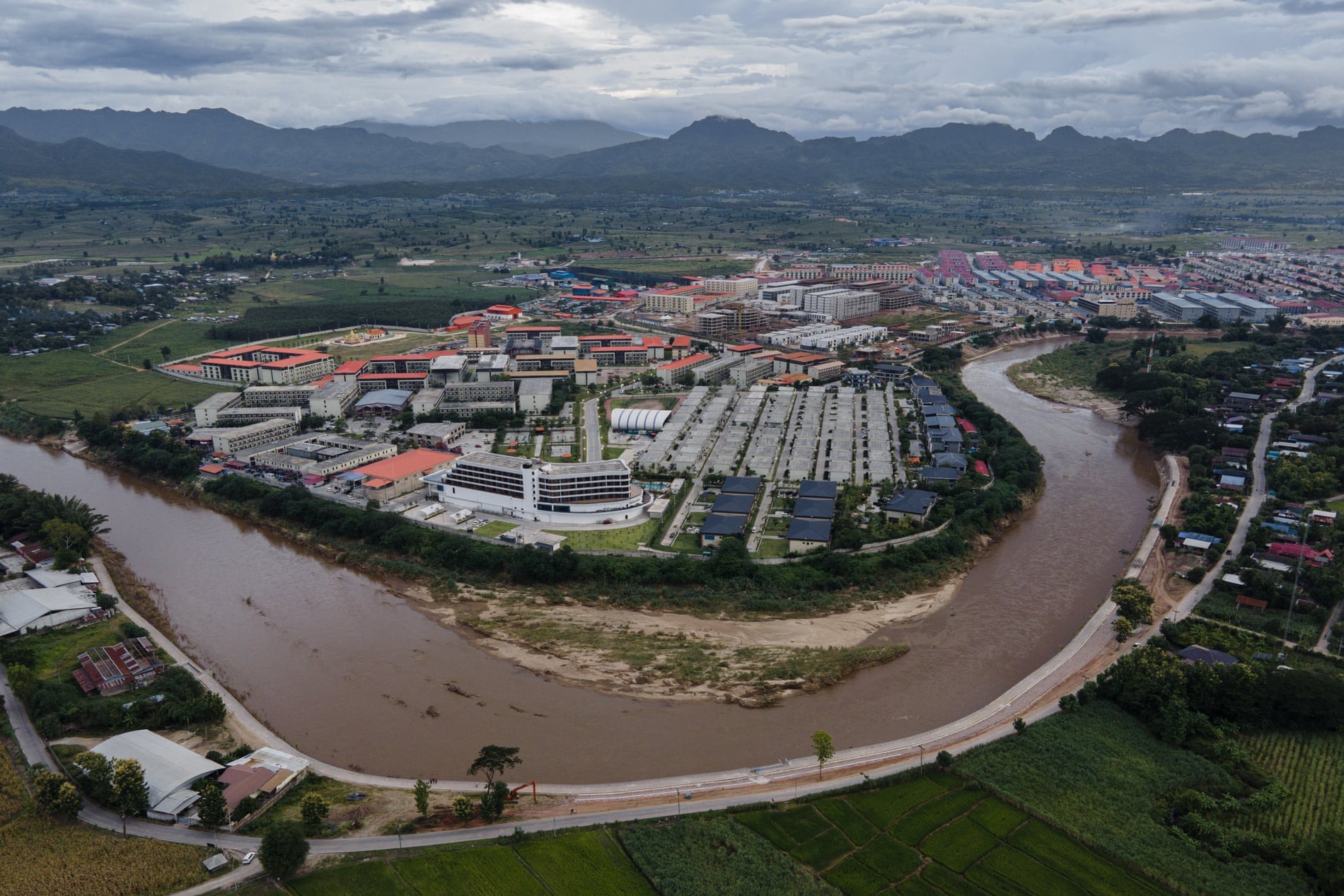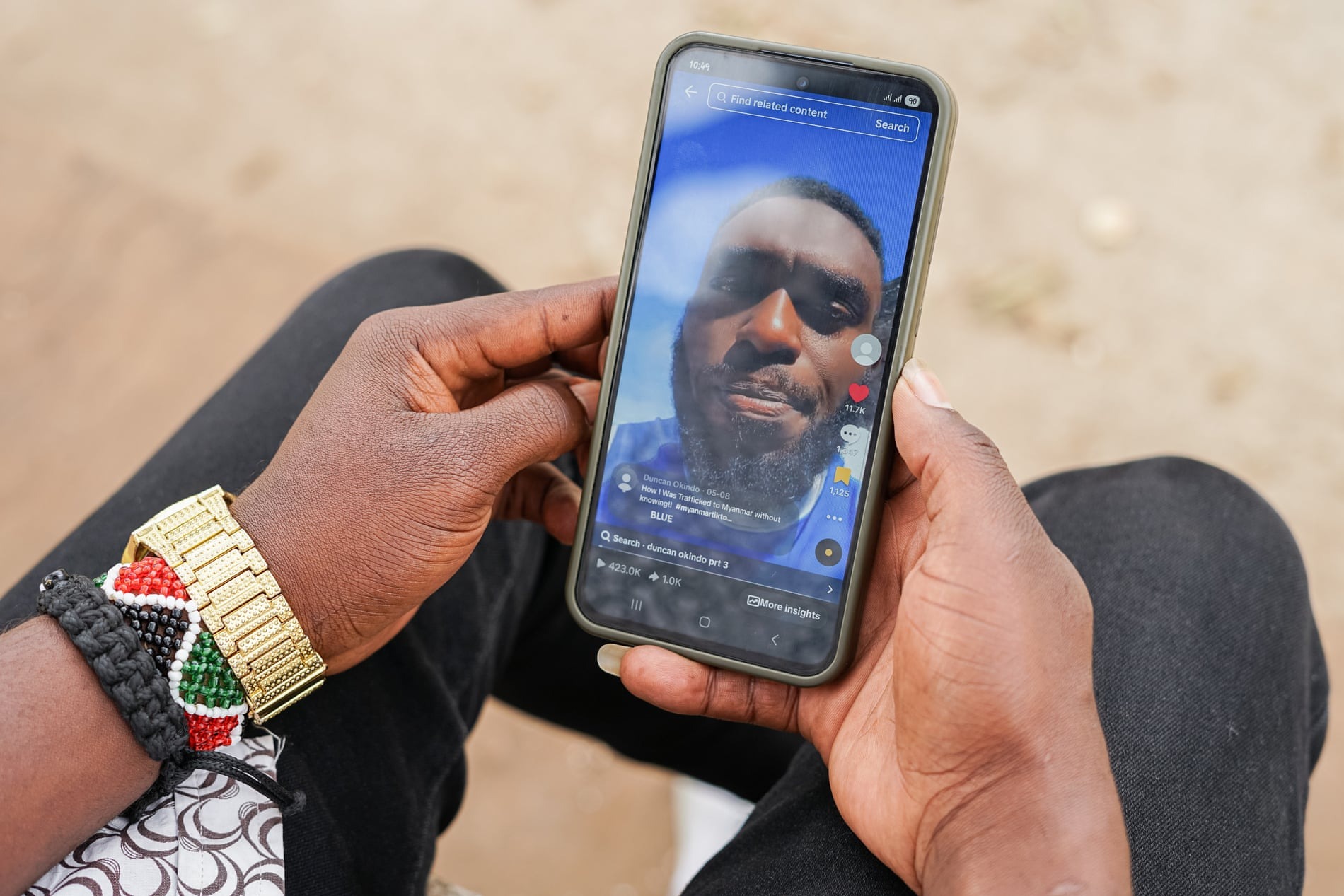Just hours after flying from Nairobi to Bangkok late last year for a customer service job, Duncan Okindo realized something was wrong. The 26-year-old had sold livestock, borrowed money from friends, and used his savings to pay a 200,000 Kenyan shilling (1,548 USD) recruitment fee.
"I felt it would be better to go abroad and earn money to support my family," Okindo said in a September 9 Guardian article. "I tried hard to find a job in Kenya, but life here pushed me to the brink."
 |
Duncan Okindo in Nairobi. Photo: Guardian |
Duncan Okindo in Nairobi. Photo: Guardian
When a truck picked up Okindo and six other Kenyans at the Bangkok airport, the driver confiscated their passports, telling Thai customs officials they were tourists. After hours in the vehicle, they were taken by boat across a river, exhausted and confused.
Okindo's group was trafficked to Myanmar, where they were confined to a walled compound with guards, run by a Chinese crime syndicate. For the next three months, Okindo worked every day, forced to send messages from thousands of fake social media accounts, posing as a wealthy American investor to lure US real estate agents into investing in digital currency.
If he didn't meet his daily quota, he was beaten, locked in a cold room, and denied food and water for two days. Okindo prayed he wouldn't be electrocuted and sexually assaulted like others.
"It was hell on earth," he said. "I completely broke down, to the point of losing all hope."
Okindo was finally released from Myanmar's KK Park in April. He is among a growing number of Kenyans, Ugandans, and Ethiopians trafficked to Southeast Asia as criminal gangs seek to expand their workforce by targeting East African labor.
Online scam centers have proliferated in Myanmar since the 2021 coup. Along the border with Thailand, the number of compounds has increased from 11 to 26 in the past four years.
The United Nations estimates at least 120,000 people are trapped in online scam centers across Myanmar, while human trafficking experts and rescue groups say current crackdowns have done little to diminish the industry. The centers are often run by Chinese crime syndicates under the protection of Myanmar's military organizations.
Okindo is among the fortunate few rescued through a joint operation between the Thai and Myanmar governments and East African countries, as well as police and militia groups. Victims are only returned to Thailand after their governments agree to pay for repatriation.
Since 2020, these scam centers have tricked hundreds of thousands of people into “pig butchering”, a term for building trust with victims before defrauding them. The industry initially targeted Chinese nationals, then shifted to Southeast Asians and Indians, and now Africans.
Criminal gangs turned to scamming victims in the US and Europe after the Chinese government implemented crackdowns to prevent its citizens from being targeted.
Benedikt Hofmann, a representative of the United Nations Office on Drugs and Crime in Southeast Asia and the Pacific, said some trafficking networks have shifted to seeking English speakers proficient in technology, including East Africans, thousands of whom are trapped in Southeast Asian scam centers.
As public awareness grows in each country, recruitment becomes harder. “Nowadays, recruiting large numbers of people from places like India is becoming much more difficult,” Hofmann said. “That’s also why we’re recording an increase in trafficking in Africa.”
 |
KK Park center on the Myanmar-Thailand border. Photo: Guardian |
KK Park center on the Myanmar-Thailand border. Photo: Guardian
According to Roseline Njogu, Kenya's principal secretary for diaspora affairs, the Kenyan government repatriated 175 citizens from Myanmar between January and April. This is a sharp increase from the 150 trafficked Kenyans rescued from across Southeast Asia between 2022 and 2024. Hundreds of other repatriated Africans are citizens of countries like Ethiopia and Uganda.
In Kenya, where approximately 80% of the population is under 35 and unemployment is high, President William Ruto's government has promoted labor export programs. A recent survey found 4 out of every 10 young Kenyans are considering migrating.
Mutuku Nguli, executive director of the East Africa Counter-Trafficking in Persons Foundation, said modern-day slave recruiters have exploited the government’s migration push, targeting Kenyans through online job ads, social media, text messages, or by going directly to rural areas.
Repatriation is costly and challenging. After receiving individuals at the border, Thai officials must determine if they are truly trafficking victims before returning them home.
When Susan Wafula was rescued from a romance scam center in Myanmar in 2022, she was transferred to four detention centers in Thailand over a month for verification before finally returning home.
"I was in a cell waiting to be verified as a victim and to regain my freedom," said Wafula, 32. "If I hadn't been lucky, I would have rotted there.”
Uganda and Ethiopia both lack embassies in Thailand, limiting their ability to locate victims in Myanmar. Earlier this year, dozens of Ugandans and Ethiopians were stranded at the Myanmar-Thailand border as repatriation efforts stalled.
Jason Tower, an expert with the Global Initiative Against Transnational Organized Crime, said gangs exploit the lack of East African diplomatic representation in Southeast Asia to prevent victims from seeking help, even taunting them by saying their governments don't care about them, to make them lose hope.
"Ultimately, the gangs turn these people into money-making machines operating as high-performing scammers," Tower said.
Even as East African nations have repatriated their citizens, recruitment agencies continue to lure victims with job advertisements. Okindo and Wafula showed reporters messages from Kenyans considering working in Southeast Asia.
 |
Okindo shares his experience of being enslaved in Myanmar on his personal TikTok channel. Photo: Guardian |
Okindo shares his experience of being enslaved in Myanmar on his personal TikTok channel. Photo: Guardian
In May, Okindo, who has a diploma in mass communication, sued the recruitment agency and the staff who sent him to Myanmar, accusing them of human trafficking and complicity in enslaving him. A Nairobi court issued an injunction barring the company from recruiting people for overseas work.
Since returning, Okindo has repeatedly shared his story on TV, TikTok, and other social media platforms. He connects victims trapped in Myanmar with lawyers, aid organizations, and embassies, helping them return home. He wants to raise public awareness of scam companies and fake jobs, encouraging victims to seek justice.
"I have helped many people understand," he said. "Sometimes I'm afraid to talk about what I went through, but I tell myself, no matter what, speak up to save many people instead of staying silent."
Hong Hanh (According to Guardian)












